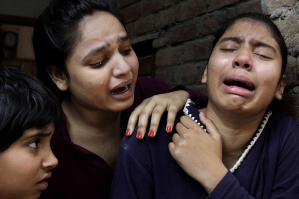
Suicide bombers launched attacks against two churches conducting Sunday morning services in Pakistan, killing at least 14 people and injuring 70 others. The Pakistani Taliban claimed responsibility for the attacks.
According to Tim Craig of the Washington Post, the Pakistani Taliban took credit for the attacks, which were targeted at Catholic and Protestant churches in a predominantly Christian neighborhood by Lahore. Although police said that the bombers were stopped by either worshippers or security personnel, the bombers still managed to detonate their explosives.
"Our brothers shed blood only because they are Christians," Pope Francis said when he heard of the news from Pakistan.
Krishnadev Calamur of NPR reported that the pope condemned the attacks. He told the crowd at St. Peter's Square in the Vatican that he felt "great pain."
"These are Christian churches," he said. "Christians are persecuted; our brothers spill their blood simply because they are Christians."
Sophia Saifi and Jethro Mullen of CNN reported that video aired by affiliate GEO News showed "twisted metal, shattered glass and panicked residents outside a church compound." Ehsanullah Ehsan, a spokesman for the Pakistani Taliban, told CNN by phone that such attacks would continue until "Sharia law is implemented in Pakistan."
"The Christian community is a soft target for militant outfits in Pakistan," Rabia Mehmood, a researcher at the Jinnah Institute, a Pakistani think tank, said. "But generally Christians and other religious minorities are under a constant threat by the extremist elements in the society and rampant religious intolerance."
Craig reported that some Christians in Lahore became angry in the aftermath of the bombings, which led them to smash windows and block traffic there. A mob even managed to beat up two people allegedly involved in the attacks and set them on fire.
"Christians make up only about 1 to 2 percent of Pakistan's population, but some analysts say they account for up to 10 percent of Lahore's population," Craig wrote. "Many Christians in Pakistan are poorly educated and relegated to living in slums and working menial jobs."
However, Christians, along with other minorities such as Shiites, Ahmadis, Sikhs and Hindus, have been previously attacked in the predominantly Sunni Muslim country. According to CNN, the last major attack against Christians in Pakistan happened in the northwestern city of Peshawar back in 2013, when suicide bombers blew up a church there that killed more than 80 people.
Peter Jacob, a Christian activist in Lahore, told Craig that despite Pakistan's military efforts against the Taliban and other Islamist militants, he contended that the "root causes of extremism" have not been adequately addressed.
"There is so much hate speech against minorities and flaws in the school curriculum, but nothing has been done to do away with it," Jacob said.
According to CNN, the pope called for peace in Pakistan, praying that "this persecution against Christians, which the world tries to hide, might end, and that there be peace."







